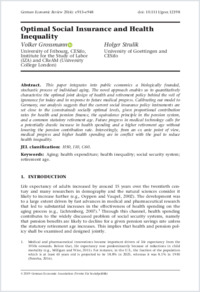Optimal Social Insurance and Health Inequality
BP2-STS
- Grossmann, Volker ORCID University of Fribourg, Fribourg , Switzerland; CESifo, Munich , Germany; Institute for the Study of Labor (IZA), Bonn , Germany; CReAM (University College London), London , United Kingdom of Great Britain and Northern Ireland
- Strulik, Holger University of Goettingen, Göttingen , Germany; CESifo, Munich , Germany
- 2019
Published in:
- German Economic Review. - Walter de Gruyter GmbH. - 2019, vol. 20, no. 4, p. e913-e948
English
This paper integrates into public economics a biologically founded, stochastic process of individual aging. The novel approach enables us to quantitatively characterize the optimal joint design of health and retirement policy behind the veil of ignorance for today and in response to future medical progress. Calibrating our model to Germany, our analysis suggests that the current social insurance policy instruments are set close to the (constrained) socially optimal levels, given proportional contribution rates for health and pension finance, the equivalence principle in the pension system, and a common statutory retirement age. Future progress in medical technology calls for a potentially drastic increase in health spending and a higher retirement age without lowering the pension contribution rate. Interestingly, from an ex ante point of view, medical progress and higher health spending are in conflict with the goal to reduce health inequality.
- Faculty
- Faculté des sciences économiques et sociales et du management
- Department
- Département d'économie politique
- Language
-
- English
- Classification
- Economics
- License
- Rights reserved
- Open access status
- green
- Identifiers
-
- DOI 10.1111/geer.12198
- ISSN 1468-0475
- Persistent URL
- https://folia.unifr.ch/unifr/documents/323739
Statistics
Document views: 40
File downloads:
- germaneconomicreview-2019-grossmann-optimalsocialinsuranceandhealthinequality.pdf: 133
